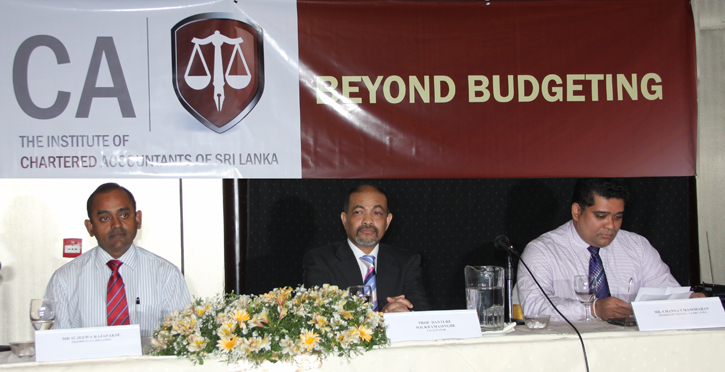As pressure mounts for better corporate performances, with shareholders demanding firms to be among the top of their industry peer group, renowned Professor of Management Accounting, Prof. Danture Wickramasinghe of the University of Hull, UK recently explored the tenability on how Sri Lankan corporates can move out of conventional budgeting and focus on a more productive mechanism which will bring long term success for companies.
Addressing a CPD seminar titled ‘Beyond Budgeting: Can this be Tenable in Sri Lanka?,’ organized by the Institute of Chartered Accountants of Sri Lanka (CA Sri Lanka), Prof. Wickramasinghe emphasized that the old command-and-control management style is out of tune with the new need for agile and adaptive leadership and the need to transfer more power and authority to people closer to the customer.
He stressed that today budgeting is out of kilter with the competitive environment and no longer meets the needs of either executives or operating managers.
“Budgets are rarely strategically focused and often contradictory, Budgets concentrate on cost reduction and not on value and Budgets constrain responsiveness and flexibility and are often a barrier to change; among much other negativity,” Prof. Wickramasinghe said.
The principles of Beyond Budgeting offer a new coherent management model. It assumes that front-line managers are able to regulate their own performance. Senior executives provide a supportive role. They challenge and coach, but decisions are taken locally within a clear governance framework based on principles, values and boundaries. In the new coherence, relative improvement contracts, strategic models, rolling forecasts and service-level agreements make sense.
As an alternative he proposed that companies should, instead of setting a fixed sales/profit target, should trusts everyone to maximize profit potential by continuously improving against an agreed upon benchmark and remaining in the top of the industry peer group.
“Instead of a fixed reward, managers are rewarded by a peer review panel based on performance and with ―hindsight at the end of each year and instead of an agreed action plan, the organization trusts everyone to take whatever action is needed to meet medium-term goals,” he said.
According to the Prof., there must also be a wider coherence among the organization’s success factors, its strategy, its management processes, and its leadership styles and culture. The process is about lifting the burden of bureaucracy from the shoulders of front-line people, eradicating the dependency culture and enabling people to accept even more responsibility for their own performance.
“As you move beyond budgeting, your structure should become more networked, using independent units with distributed capabilities and expertise. You will be able to locate and combine expertise across the network and seamlessly bring collective expertise together to provide customer solutions. That way, teams can share knowledge across the business as they respond to customer demands,” Prof. Wickramasinghe adviced.
Do not link rewards to fixed targets agreed upon in advance, he adviced and instead suggested for set bonuses based on a relative improvement contract that involves a whole team setting and meeting a range of performance benchmarks over a period of time. Use a peer review group to evaluate their performance with the benefit of hindsight. The peer panel must ask, ―Did they do as well as they could have done given what we know about the profit-making opportunities during the period and what the competition has achieved?
“The calendar or fiscal year may be an appropriate time period for reporting results to investors but it is unlikely to be for managing the business. Focus instead on continuous value creation. Managers need fast access to resources. Although you may provide parameters within which resources can be committed, within these limits managers should have wide discretion over how they utilize resources. Provide fast-track approval for major projects outside the budgeting process. Major projects should be approved as needed, not because it is the right time of the year. Managers should have the power to implement small projects,” Prof. Wickramasinghe noted.
He said, Let the pace of market demand set commitments, while emphasizing that Whenever possible companies must respond to unanticipated customer requests. “Give those who are making the front-line decisions access to customer profitability information or they risk creating losses as the costs of customizing affect customer profitability,” he said.
Giving an example on a company which abandoned conventional budgeting, Prof. Wickramasinghe disclosed that Swedish Bank Svenska Handelsbanken was struggling and losing customers, especially to a smaller rival run by Dr. Jan Wallander. So the bank invited him to join it as its new CEO. He accepted with the proviso that the bank would have to radically decentralize operations and abandon its budgeting process.
Since abandoning the budgeting model in the 1970s, the bank has produced outstanding return for shareholders, consistently beating all its European rivals on the key ratios of cost-to-income and costs-to-total assets. The CEO credits its decentralized management model as a major source of competitive advantage.
Danture Wickramasinghe is Professor of Management Accounting and the Director of the Centre for Accounting and Accountability Research at Hull University Business School, University of Hull, UK. As the first Sri Lankan to be a Professor in Accounting in a British university, he has joined Hull after 19 years of research and teaching at the University of Manchester where he earned his PhD in Management Accounting, again as the first Sri Lankan to earn this degree.

















